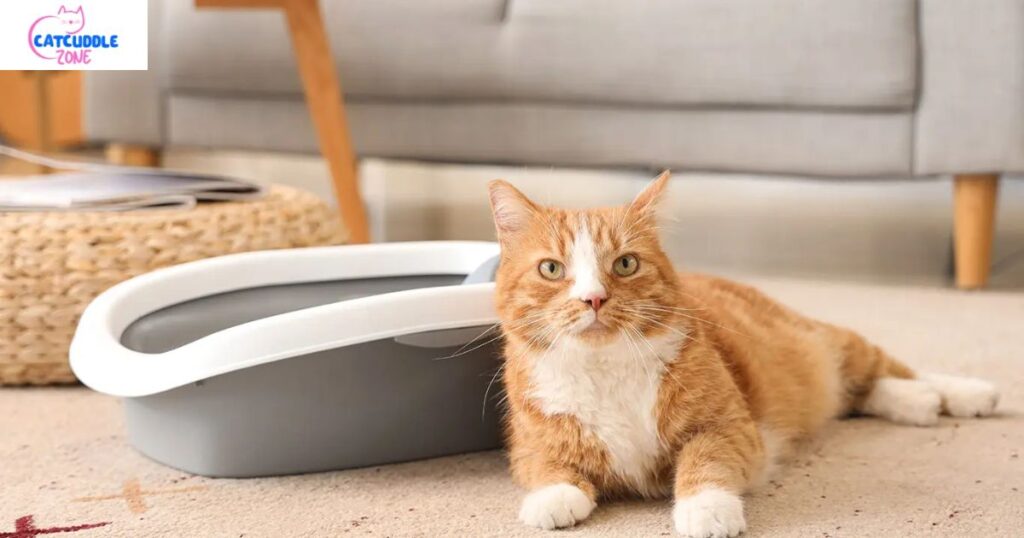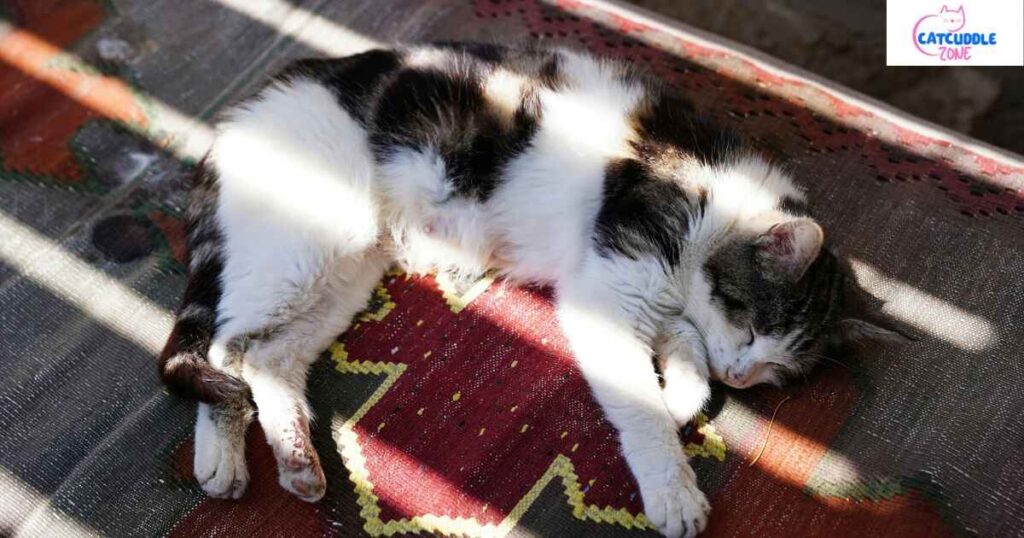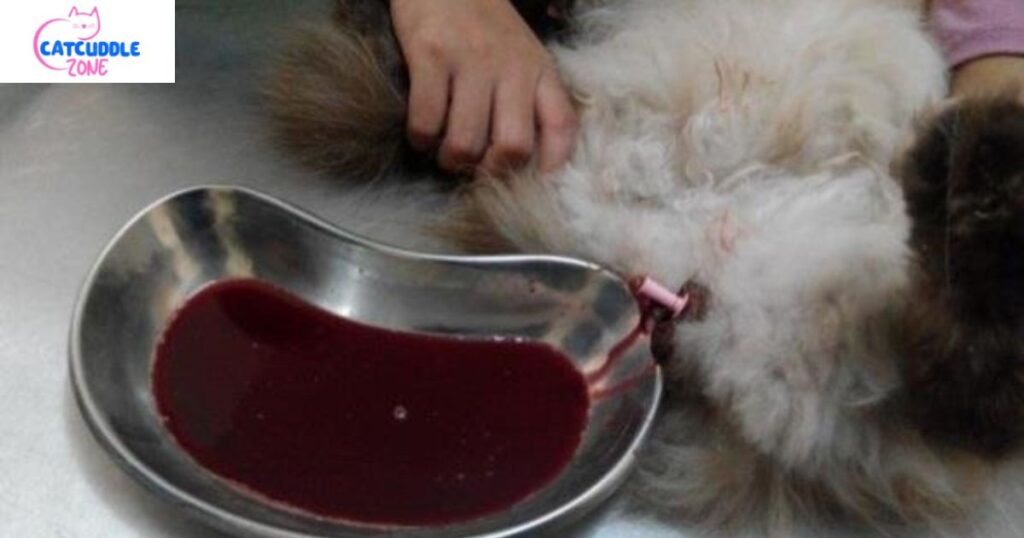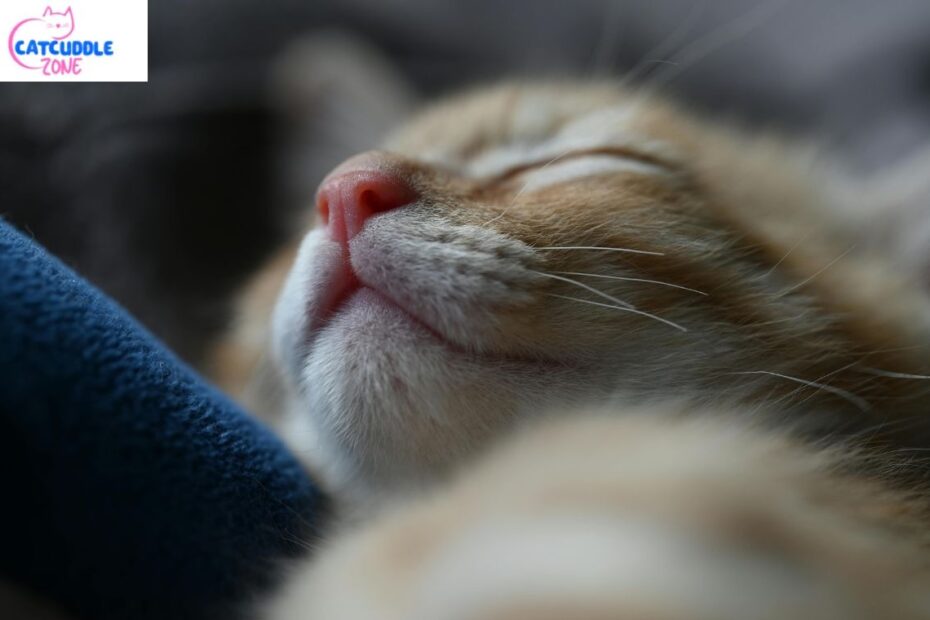Discovering blood in cat urine (hematuria in cats) can leave any pet parent worried and unsure of what’s happening. In many cases, this symptom points to serious urinary tract problems in cats that need quick attention. Sometimes the urine looks pink, red, or brown, while at other times the change is hidden and only detected through urinalysis and urine culture for cats. Causes range from feline idiopathic cystitis (FIC) and urinary tract infections to stones, trauma, or stress. Understanding the possible reasons, symptoms, and treatment options helps cat owners act fast, protect their pets’ health, and prevent complications before they become emergencies.
Understanding Why Blood Appears in Cat Urine
Cat urine blood occurs when blood vessels break and discharge the blood into the urine of the kidneys, bladder, or urinary tract. In some instances, the urine appears red or pink, in others, the change is so insignificant that it could be noticed just when a urinalysis is carried out. Blood clots in the cat urine can also show that the internal bleeding is more serious and noticed by pet parents.
The primary cause of blood manifestation is irritation or injury to the urinary system. From feline idiopathic cystitis (FIC) to cat urinary crystals and bladder stones, various health conditions may cause bloody urine. In the USA, the vets tend to emphasize the idea that early diagnosis of bloody urine in cats can save lives.
Symptoms That May Accompany Blood in Urine
Bloody urine in cats symptoms often appear alongside other signs. Cats may show symptoms of bloody urine in cats normally occurring in combination with other symptoms. Straining to urinate, frequent urination, painful urination, peeing outside litter boxes, and moaning during urination may be seen in cats. There are those cats that conceal themselves, over lick, or even pee in peculiar places such as the sink and the bathtub.
More serious symptoms are pallor of the gums, listlessness, weakness, collapse, dyspnea, or hematemesis. The symptoms indicate potential contamination of the kidneys, clotting disease in cats, or cat urinary obstruction which need immediate veterinary attention.

Is Blood in Cat Urine an Emergency?
The question most of the cat owners ask is is blood in cat urine an emergency? The solution varies depending on the reason. In case your cat is unable to urinate, appears to be in pain or appears to be weak, this is an emergency. A urinary obstruction in cats is a condition that is fatal in a couple of hours unless it is treated.
Cats who have urinary tract issues should never be ignored even in less urgent cases. The American vets suggest making virtual vet appointments or urgent visits. Timely intervention avoids problems and saves money in the long-term.
Common Causes of Blood in Cat Urine
The most widespread causes are the presence of urinary tract infection in cats (UTIs), feline lower urinary tract disease (FLUTD), the existence of bladder stones, or the existence of urinary crystals. The stress can also cause stress-induced inflammation in the bladder of cats with feline idiopathic cystitis (FIC) that is frequently associated with it.
Trauma or poisoning with other substances, tumors, or clotting diseases may also be other causes in cats. Kittens can have kitten urinary health problems, including congenital defects, like ectopic ureter or urachal remnant.
| Cause | Details |
| Urinary Tract Infection (UTI) | Common in older cats, diagnosed with urinalysis and urine culture for cats |
| FIC | Stress-driven, no infection, recurrent issue |
| Stones/Crystals | Painful, may block urine flow, needs surgery or diet |
| Trauma/Toxins | Accidents or exposure to poisons like rat poison |
| Tumors | Usually in senior cats, require imaging and biopsy |
How Veterinarians Diagnose the Problem
As a preliminary, vets conduct a physical examination and talk about the history of the cat. Then urinalysis, urine culture, blood tests, clotting profiles, ultrasound, and X-rays are used to ensure the cause. At times, the vets can also carry out cystocentesis to get the urine directly out of the bladder.
Diagnostic imaging assists in the detection of cat urinary crystals and tumors or bladder stones. Infections, immune-mediated hemolytic anemia, or immune-mediated thrombocytopenia are determined by blood tests. All of these are important steps in managing the disease of the feline urinary tract.

Treatment Options for Cats Peeing Blood
The management of cat peeing blood is based on the cause. In cases of infection antibiotics are taken and in cats bladder stones or obstruction of the urine drainage may require surgery. In severe conditions, hospitalization, fluid replacement, treatment and pain management is required.
In stress-related cases such as that of feline idiopathic cystitis (FIC), vets tend to prescribe nutritional therapy, stress therapy and lifestyle change. The hydration of cats and special care with urinary diets is helpful in preventing another recurrence.
Home Care Before and After the Vet Visit
Cats with urinary issues are provided with home care, which involves hydration, provision of numerous water bowls, and provision of wet food. A clean litter box assists the owners in monitoring the urine changes in color and frequency.
Follow directions of medication after visits to the veterinarian. Decrease stress levels at home, offer calm rest areas and furnish the environment with toys and scratching posts. This minimizes the risk of bladder inflammation in cats reoccurring due to stress.

Preventing Blood in Cat Urine
Prevention starts with proper diet and hydration. Feeding prescription urinary diets and keeping fresh water available reduces the risk of urinary crystals and bladder stones. Stress should be minimized with a predictable routine and playtime.
Regular vet checkups in the USA are vital. Annual wellness exams detect problems early, while virtual vet appointments help monitor ongoing cases. Prevention is easier and less costly than emergency treatment.
When to Seek Urgent Veterinary Care
Seek emergency vet care if your cat shows straining to urinate, collapse, pale gums, lethargy, weakness, or inability to pass urine. These are life-threatening signs of urinary obstruction in cats.
Cats that continue to pass bloody urine despite treatment should be re-examined quickly. Hospital care may be needed if symptoms worsen, especially with blood clots in cat urine or ongoing pain.
FAQs About Blood in Cat Urine
Is cat peeing blood an emergency?
Yes, it can be an emergency, especially if your cat can’t urinate or seems weak—see a vet right away.
How to treat a cat with blood in urine?
Treatment depends on the cause and may include antibiotics, surgery, pain relief, or special urinary diets prescribed by a vet.
Can blood in urine go away on its own?
Sometimes stress-related cases improve, but most need medical treatment to prevent serious complications.
Can dehydration cause blood in urine in cats?
Yes, dehydration increases the risk of urinary crystals and bladder stones, which may lead to bloody urine.
How to tell if a cat has UTI?
Watch for straining, frequent urination, painful urination, and peeing outside the litter box; a vet confirms with urinalysis.
